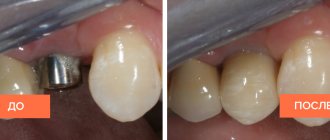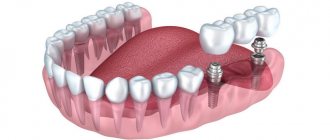Almost everyone, without exception, has to go to the dentist, and on a regular basis, since teeth tend to deteriorate. So you need to undergo at least a routine examination every six months to a year (depending on who’s health). Today, going to the dentist is an expensive procedure, which is why interest in guarantees for treatment is growing. If they are provided, within a certain period of time, clients can contact a doctor so that he can correct the breakdown or his own mistake. Moreover, the elimination of the defect should be carried out, if not completely free, then at a significant discount.
What is the difference between the obligations of a company and dentistry?
The implantation guarantee consists of two components:
- warranty provided by the manufacturer for the titanium implant;
- guarantee for the implantation procedure from the dental clinic.
To determine the actual service life, let’s consider how the clinic’s warranty differs from the service life established by the manufacturer.
How many years does the warranty last for implants? Is there a lifetime warranty?
Each dental implant manufacturing company provides an official guarantee for the product. Thus, the manufacturer promises that the implant will retain its shape and functionality throughout the specified period.
- Premium implants come with a lifetime warranty.
- The warranty period for mid-segment designs ranges from 10 to 25 years.
- Economy class systems have a 10-15 year warranty.
A middle-class implant can last a lifetime, but a premium system can cause complications after a short period of time.
If the implant breaks or is defective, the manufacturer will replace it. Usually, for a technical defect to make itself felt, one year is enough. If the breakdown occurred due to the fault of the patient or doctor, replacement is not performed.
What are the obligations of the clinic during implantation?
The second form of guarantee is provided by the dental clinic and does not exceed 12-24 months . Medical institutions determine warranty periods independently. The clinic's guarantee only applies to the installation of a titanium support. As a rule, it is in the first 2 years that the risk of implant rejection is especially high, the reason for this is a violation of the implantation technology.
According to statistics, most complications after implantation in the early period are due to medical negligence or inexperience. The reason for non-survival may be insufficient sterility of the instruments, an incorrectly selected implant, or rough preparation with a bur.
If the implant is rejected after 3-5 years, then other reasons beyond the doctor’s control contribute to this. For example, insufficient hygiene or systemic diseases. Therefore, the doctor is not obliged to extend the guarantee for a longer period.
In practice, the patient cannot always obtain compensation in case of rejection. It is difficult to prove a doctor’s guilt, and not everyone is able to independently admit and correct their mistake.
Can a denture last as long as a dental implant?
The service life of an artificial crown directly depends on the material from which it is made. have the shortest service life - 2-3 years . Plastic is a brittle material that can crack over time under the pressure of chewing pressure. The porous surface structure quickly lends itself to pigmentation, becomes clogged with food debris and becomes a breeding ground for bacteria.
Metal-ceramic crowns are stronger and more durable and will last at least 10 years . Under extremely high chewing loads, the ceramic surface may chip, but if you avoid hard foods, the crown will not lose functionality until the end of the specified period.
The most durable, strong and hypoallergenic crowns are made from zirconium dioxide . Their service life is equal to that of a titanium root and is at least 15 years .
If an artificial crown breaks, there is no need to remove the implant. Only a new crown is made and attached.
What is the guarantee
The warranty period is the period after the installation of a filling or prosthesis, during which either the clinic or the doctor who directly performed the work bears responsibility for their quality . This guarantee is given for almost all services, but the duration of its validity depends on the dentist. On average, a tooth is under warranty for about 1 year. If something happens to the tooth during this period, the client may require the following:
- so that the defect that has arisen is eliminated free of charge;
- return of losses that a person had to incur to correct a mistake elsewhere;
- no longer use the services of a doctor who made a mistake, but demand financial compensation.
There may be no warranty period. In this case, a client who notices a defect can contact us within two years and everything will be corrected for free. True, doctors may refuse to work for free, but they will reduce the price.
Guarantee for fillings
A filling is one of the most popular services in dentistry , and quite often the filling is not of such high quality as to keep the tooth intact. But the warranty does not cover minor defects. For example, you will not be corrected for the following:
- if the filling does not fit tightly enough around the edges;
- if caries is found on the tooth near the filling;
- if the outer edge of the filling has changed color.
That is, defects that do not cause pain and do not interfere with the use of teeth (biting and chewing) will not be covered by the warranty. Free treatment may be offered if:
- the filling has fallen out or is moving;
- secondary caries appeared due to improper manipulation by the doctor;
- part of the crown broke off.
In this case, the doctor must help in accordance with the requirements of the law.
Guarantee for prosthetics
Prosthetics is a service that is mainly required by pensioners. And given the size of domestic pensions, many people of retirement age simply cannot afford to pay twice for the same service. Therefore, you should immediately ask whether there are any guarantees for dentures.
Of course, prosthetics can also be damaged due to the fault of the client. Such errors include:
- the patient did not wash the denture after eating;
- bit something hard (for example, nut shells, caramels, etc.);
- They went to the doctor less than once every six months to polish the prosthesis, which is why it became unusable.
In other words, if you don't take care of your prosthesis, it will break. An experienced specialist can understand at first glance whether the breakdown is his fault or whether it is the patient’s negligence. Accordingly, he will not compensate for losses or redo the work.
What determines successful engraftment and exploitation?
- Professionalism of the implantologist and orthopedist;
- implant quality;
- degree of fixation of the rod with the superstructure;
- compliance with operating and hygiene rules;
- patient's health status.
- Complete restoration of the dentition in just 4 days!
more detailsRoott Pterygoid Implants Sinus lift is no longer needed!
more details
Once and for life! Express implantation in 4 days with a permanent ReSmile prosthesis
more details
All-on-4, All-on-6, ReSmile, Zygomatic implantation We use all modern methods of dentition restoration
more details
Often, after complete tissue healing and prosthetics, patients begin to underestimate the importance of oral hygiene. Caries cannot form on artificial crowns, but dentures are no less susceptible to plaque deposits than natural teeth. Deposits lead to inflammation of the mucous membrane, which can provoke peri-implantitis and root rejection.
Each case is individual, and the actual service life depends both on the patient’s health condition and on the professionalism of the doctor.
Insurance for implantation
Dental implantation in our country is not included in the compulsory health insurance program; it is carried out for a fee. And many patients want to receive not only a guarantee from the clinic for work, implants or prostheses, but also additional life and health insurance. Some dentists practice this approach and enter into contracts with large insurance companies, which will further protect the patient in case of unforeseen situations. To receive the most complete protection - for example, from non-guarantee situations, any person can enter into a VHI agreement (additional health insurance) with a company providing such a service.
1Frome S., Complications of dental implantation: etiology, prevention and treatment, 2021.
Author: Namdakov N.V. (Thank you for your help in writing the article and the information provided)
Criteria for choosing a specialist and clinic
- It is necessary for the doctor to have a license to perform implantation and permission from the SES;
- it is important that the surgeon has extensive work experience and a positive track record;
- the doctor must provide diplomas, certificates and certificates of specialization;
- the clinic must be equipped with all necessary diagnostic and surgical equipment.
You can install implants with a clinic guarantee of up to 10 years at Dantistoff Scientific Dentistry. Doctors - candidates and doctors of science. Sign up.
Do dental clinics have warranty obligations?
Naturally, dentistry that provides services to people must be held accountable for their work. But for accuracy, all guarantees provided by the establishments in question can be divided into two large groups:
- Which are given regarding the process of providing services.
- Concerning the quality of the work performed and how durable it is.
Each group needs more detailed study.
What does the first group suggest?
The group under consideration includes all guarantees that relate to the safety of the client when he is treating a tooth. This is quite understandable, since most of the instruments and operations performed by a doctor are quite traumatic. Therefore, the clinic must guarantee the following:
- adhere to standards in the use of antiseptics and other medications, as well as observe safety precautions;
- have the required number of certificates for the use of all instruments and medications;
- the doctor must have education and appropriate qualifications;
- the specialist should not violate laws by providing services in quantities that do not harm the patient’s health;
- inform the client and begin work only after receiving consent to it.
In other words, the client should feel safe during the procedure, knowing that the doctor will not harm or deceive him. True, in this case, responsibility lies not only with the health worker, but also with the clinic.
Second type guarantees
Since the group under consideration involves the peculiarities of using and exploiting the results of the services provided, the patient should expect the following:
- the filling or prosthesis will serve for the specified period;
- the result of the dentist’s work will not harm the patient;
- all required functions will be preserved during direct use;
- the aesthetic and biological function of the product will be preserved.
The clinic must provide the doctor with all the necessary materials, and the dentist’s job is to do everything to ensure that the above guarantees come true.
In what cases is it canceled?
In case of violation of which obligations the patient may lose the guarantee if:
- Neglect of preventive examinations. If the patient did not visit the clinic, the blame for unsuccessful engraftment will fall on him. The doctor could diagnose and stop the inflammatory process at an early stage.
- The surgical and orthopedic stages of treatment were carried out in different clinics. If complications arise, no doctor wants to take the blame from his colleague. And the patient himself will have to figure out for a long time whose fault it was that the problems started.
- The patient did not comply with the medication regimen or the rules for caring for the prosthesis.
- He hid from the doctor chronic diseases or other contraindications that led to implant rejection.
- The patient smoked during the post-implantation period.
Warranty periods
The warranty period may or may not be established - this is a right, not an obligation. But doctors are obliged to guarantee the quality of their work. Therefore, if problems are noticed on a tooth after a filling, the patient may require:
- remove any defects free of charge;
- discount on services;
- re-do the work that was not done well enough;
- pay the amount that the patient paid to another doctor to correct errors.
But dentistry can only do all this if the problem occurred during the warranty period.
Why don’t dentists provide a guarantee for implantation and when is the product replaced?
Alexey Viktorovich, maxillofacial surgeon
You often hear the following advertising slogans: “100% guarantee on dental implants!”, “Warranty on implants for 20-30-40 years!” and others. To be honest, no doctor can give a 100% guarantee for any surgical procedure. Whether it's a sinus lift, osteoplasty or dental implantation. The doctor can create favorable conditions, and the positive outcome of the operation is the merit of the body. Even the simplest tooth extraction procedure has small risks of complications.
I know of one case where MIS Corporation actually replaced a defective implant. But if a patient rarely brushes his teeth or chews nuts every day, it’s his own fault.
The bottom line is this: a lifetime guarantee is a promise that the implant will not fail, not that it will not fall out due to peri-implantitis in 5 years.
Execution of consumer rights
Whether consumer rights are enforced depends on the clients. Remember - it is always important to read the contract for the service provided. It spells out all the nuances of receiving the service, as well as how long the warranty period will last. But besides this, we’ll talk about which actions in which situation are more rational to perform in order to get the maximum result and spend less time.
Replacement according to warranty terms
Most often, after the doctor has treated the tooth, after some time the filling or part of it falls out. If the warranty is still valid, it is best to contact the same dentist where you were treated before. The sequence of actions is as follows:
- call the reception desk and make an appointment with a doctor (tell us what happened);
- When you come to your appointment, take the contract and check with you (they should remind you of this at the reception, but this does not always happen);
- the doctor examines the filling and makes a verdict - whether this is a warranty case or not;
- if the doctor’s answer is not satisfactory, you can conduct an independent examination and even have the tooth treated by another doctor;
- bring the results of the examination to the dentistry, and also provide an invoice for the work performed so that the clinic compensates for losses.
Sometimes even the presence of an expert's opinion does not help. In this case, it is advisable to consult with a lawyer to develop a plan for further action. For example, make a claim or even send a lawsuit to court, which is especially important if the amount for poor-quality treatment was quite large or the specialists caused harm to health.
When does the warranty stop working?
Clinics may not operate under warranty in the following cases:
- If the patient ignored oral hygiene procedures. This item includes not only regular brushing of teeth, but also various rinses, ointments and gels. But only if the recovery period included the use of the funds in question, and this was recorded in the patient’s card.
- If someone else touched the filling. For example, after going to the dentist, a few days later the client went to another doctor, who, while treating a neighboring tooth, touched a controversial tooth (for example, he filed it a little).
- An influence of indefinable force was exerted. In particular, the client had an accident or fell, and because of this he knocked out/broke a tooth. Naturally, the doctor is not to blame for this and the patient has no right to demand compensation.
In addition, some types of fillings are not covered by guarantees at all. For example, this applies to temporary options.
Cost in Moscow
| Implantation with a lifetime guarantee on the implant | Cost, rub. |
| Osstem | |
| With metal-ceramic crown | 43000 |
| With zirconium crown | 65000 |
| Astra Tech | |
| With metal-ceramic crown | 64000 |
| With zirconium crown | 74000 |
| Nobel Biocare | |
| With metal-ceramic crown | 65000 |
| With zirconium crown | 80000 |
| Straumann | |
| With metal-ceramic crown | 77000 |
| With zirconium crown | 90000 |
| Installation with a guarantee of 10 to 25 years for the implant | Cost, rub. |
| Alpha Bio | |
| With metal-ceramic crown | 38000 |
| With zirconium crown | 50000 |
| M.I.S. | |
| With metal-ceramic crown | 40000 |
| With zirconium crown | 50000 |
Reviews
If you have information about the risks when signing warranty agreements, or you know a clinic where the agreement was drawn up as honestly as possible and without risk for the patient, share your knowledge with users of our portal in the comments.
If you find an error, please select a piece of text and press Ctrl+Enter.
Tags guarantee implantation
Did you like the article? stay tuned
Previous article
Expert opinions on dental implantation during pregnancy
Next article
Everything you need to know about testing before dental implantation
Important Factors
Before placing an implant, it is important to prepare the oral cavity for surgery. To do this, a specialist carries out professional cleaning of the teeth, removes tartar and plaque. If there is a deficiency of bone tissue, bone augmentation is carried out. During the operation, an important condition is the professionalism and experience of a specialist - an implantologist and an orthopedic dentist. An experienced specialist should carry out the following activities before implanting the implant and after the operation:
- correctly select the design and its size;
- eliminate foci of the infectious process - cysts, granulomas;
- will carry out competent sanitation of the oral cavity, including sanitation of the socket of an extracted tooth;
- determine the volume and density of bones;
- will prevent increased load on the implant;
- will not allow excessive overheating of the bone during preparation;
- applies high-quality sutures;
- will give the correct recommendations after installing the product.
If all rules are followed, the structure will last much longer.
Will the prosthesis last as long as an implant?
All types of crowns and dentures require replacement after a certain period. However, it is possible that with proper and careful care they will last you a lifetime.
Important! Replacing a prosthesis does not entail replacing an implant. The abutment may need to be replaced if the new crown has a different design shape.
Service life of prostheses:
- Metal ceramics – 10–12 years
- Zirconium oxide – from 20 years











